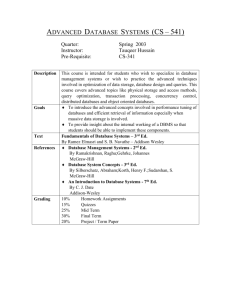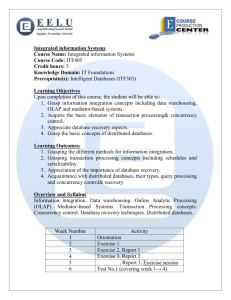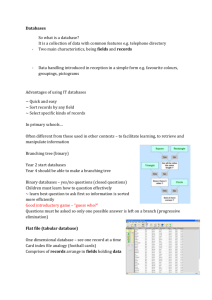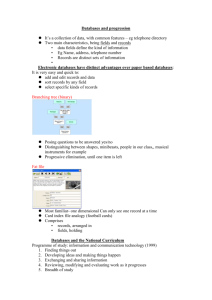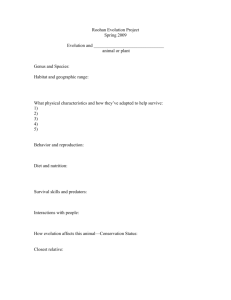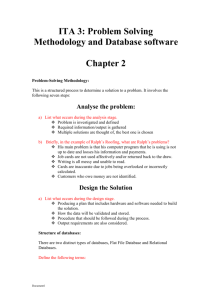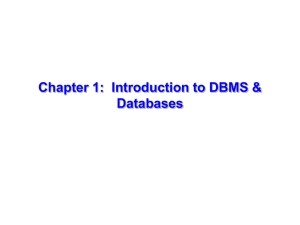doc
advertisement
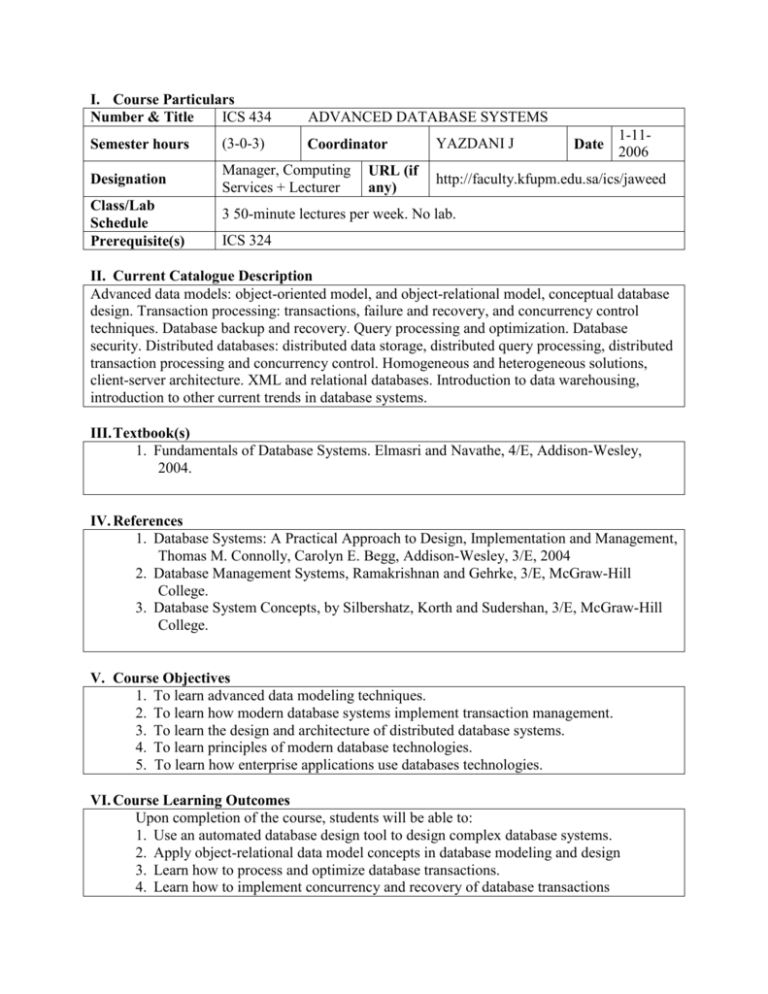
I. Course Particulars ICS 434 Number & Title ADVANCED DATABASE SYSTEMS Semester hours (3-0-3) Designation Manager, Computing Services + Lecturer Class/Lab Schedule Prerequisite(s) Coordinator URL (if any) YAZDANI J Date 1-112006 http://faculty.kfupm.edu.sa/ics/jaweed 3 50-minute lectures per week. No lab. ICS 324 II. Current Catalogue Description Advanced data models: object-oriented model, and object-relational model, conceptual database design. Transaction processing: transactions, failure and recovery, and concurrency control techniques. Database backup and recovery. Query processing and optimization. Database security. Distributed databases: distributed data storage, distributed query processing, distributed transaction processing and concurrency control. Homogeneous and heterogeneous solutions, client-server architecture. XML and relational databases. Introduction to data warehousing, introduction to other current trends in database systems. III. Textbook(s) 1. Fundamentals of Database Systems. Elmasri and Navathe, 4/E, Addison-Wesley, 2004. IV. References 1. Database Systems: A Practical Approach to Design, Implementation and Management, Thomas M. Connolly, Carolyn E. Begg, Addison-Wesley, 3/E, 2004 2. Database Management Systems, Ramakrishnan and Gehrke, 3/E, McGraw-Hill College. 3. Database System Concepts, by Silbershatz, Korth and Sudershan, 3/E, McGraw-Hill College. V. Course Objectives 1. To learn advanced data modeling techniques. 2. To learn how modern database systems implement transaction management. 3. To learn the design and architecture of distributed database systems. 4. To learn principles of modern database technologies. 5. To learn how enterprise applications use databases technologies. VI. Course Learning Outcomes Upon completion of the course, students will be able to: 1. Use an automated database design tool to design complex database systems. 2. Apply object-relational data model concepts in database modeling and design 3. Learn how to process and optimize database transactions. 4. Learn how to implement concurrency and recovery of database transactions 5. Understand the security issues of database systems and implement proper security measures in database systems. 6. Understand the architecture and implementation of distributed and replicated database systems 7. Design distributed database systems. 8. Understand the basics of data warehousing. 9. Understand the basics of new trends such as: XML in relational databases, logic database, spatial data, multimedia databases, and federated databases. VII. Prerequisites by Topic VIII. Major Topics Covered File Organization (Self Reading) The Relational Data Model: Version2 Advanced Data Modeling Client-Server Architecture Databases on the Web XML & Relation Databases The System Catalog Query Processing and Optimization Transaction Processing Concurrency Control Recovery Database Administration & Security Distributed & Replicated Databases Object-Oriented & Object-Relational DBs Intro to Data Warehousing and Data Mining Other Emerging Database Technologies IX. Laboratory Projects Topic Number of Weeks Not Applicable Not Applicable X. Contribution of course to meeting the professional component The students will analyze and develop complex database design using different techniques. Advanced technologies including architecting multi-tier architectures related to database systems will be studied. The course focuses major issues in databases affecting management and performance of database systems. Homework assignments contribute to sharpening their abilities to understand concepts and relate to practical issues. The course projects emphasize concepts studied through the implementation of large, multi-tier database systems including enterprise resource planning (ERP) systems. XI. Relationship of course to program outcomes Program 1 2 3 4 5 6 7 8 9 10 11 12 13 14 Outcome Course 4,5,6,8,9 Outcome 2,7 3 1 XII. Estimated Curriculum Category Content (Semester hours) Area Core Advanced Area Core Algorithms Data Structures Software Design Prog. Languages Comp. Arch. Advanced XIII. Oral and Written Communications Every student is required to submit at least 2 written reports (not including exams, tests, quizzes, or commented programs) of typically 5-10 pages and to make 2 oral presentations of typically 10 minute’s duration. XIV. Social and Ethical Issues A number of social and ethical issues for students are emphasized during the entire course term including 1. 2. 3. 4. legal and ethical practices related to technology use. facilitate student enquiry of legal and ethical issues related to technology and society. promote safe and healthy uses of technology resources. facilitate equitable student access to technology resources and promote working as teams. XV. Theoretical Content Transaction Processing (9 hours) Concurrency (9 hours) Query Optimization (6 hours) Distributed Database Systems (12 hours) XVI. Problem Analysis Students are exposed to advanced problems and issues related to database systems and architectures. They experience and analyze problems associated with database environments and address some of these problems with solutions as assignment and project work with reasonable degree of success. XVII. Solution Design At least 2 assignments and course projects are focused on design of complex database systems and architectures. A multi-tier environment, including web, application and data tiers, is emphasized in design activities. Students also focus on heuristics algorithms associated with some hard problems in transaction processing, concurrency, query optimization, warehousing, mining and distributed systems.
